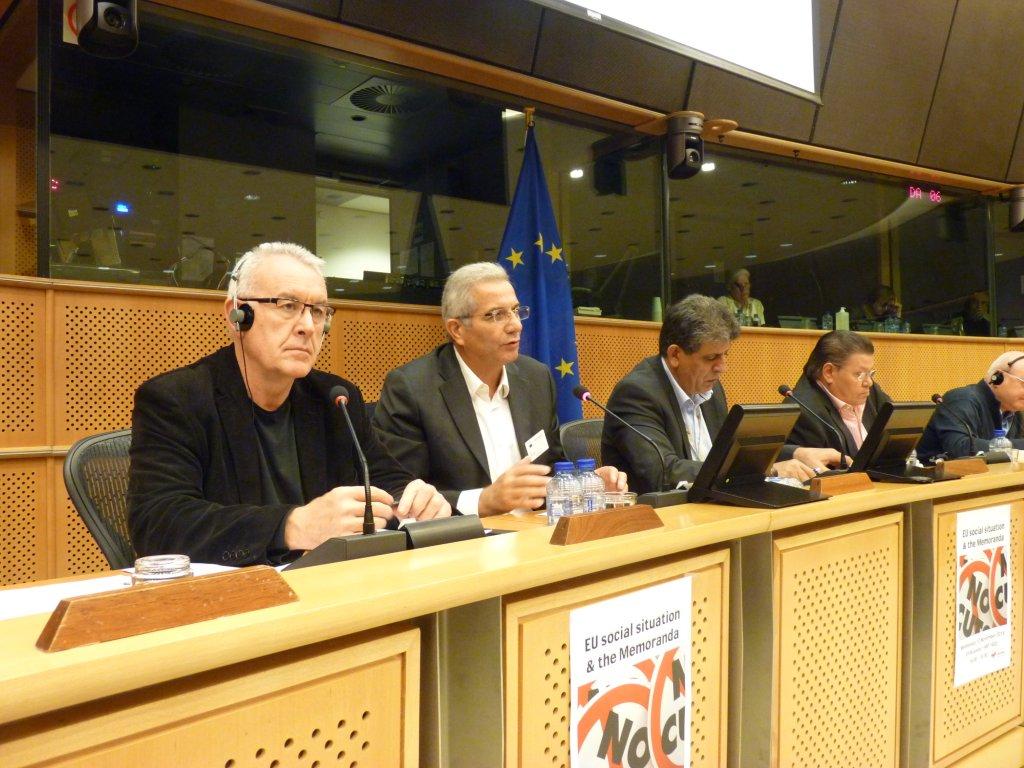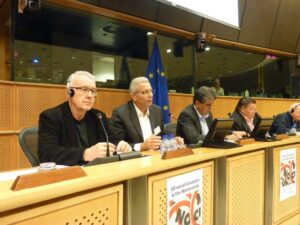
Address by Andros Kyprianou, General Secretary of the C.C. of AKEL, at the Meeting of the GUE/NGL Group entitled “The Economic and social situation in the EU and the Memoranda”
12th November 2014, European Parliament, Brussels
 It is with great pleasure that today we, together with the Group of the European United Left/Nordic Green Left, the Portuguese Communist Party (PCP) and the Communist Party of Spain (PCE), are organizing the Hearing “The Economic and Social Situation in the EU and the Memoranda.” We have brought with us in our Visitors representatives of the Pancyprian Union of Government Doctors and Pancyprian Trade Union of Nurses, representatives from various trade union and professional sectors, educational and student Organisations. AKEL seeks to pay attention very closely to their concrete problems in all sectors and takes their views very seriously into account. We consider that their presence here will enrich the discussion and contribute towards drawing more wide-ranging and in-depth conclusions.
It is with great pleasure that today we, together with the Group of the European United Left/Nordic Green Left, the Portuguese Communist Party (PCP) and the Communist Party of Spain (PCE), are organizing the Hearing “The Economic and Social Situation in the EU and the Memoranda.” We have brought with us in our Visitors representatives of the Pancyprian Union of Government Doctors and Pancyprian Trade Union of Nurses, representatives from various trade union and professional sectors, educational and student Organisations. AKEL seeks to pay attention very closely to their concrete problems in all sectors and takes their views very seriously into account. We consider that their presence here will enrich the discussion and contribute towards drawing more wide-ranging and in-depth conclusions.
In the era of the Memoranda, democracy and the sovereignty of states are being eroded. Decisions are not taken by the representatives of the peoples, but in Brussels. Although they invoke the interests of the people, the people are never asked to express their own will directly on the policies which others are taking on their behalf and in their name. At the same time, national parliaments are playing a secondary role of formally approving decisions. Indeed, in most cases this is done through blackmail.
The capitalist crisis is continuing because of the austerity attack and cuts which have been institutionalized by the European Union. Today a relationship that is characterized by two general elements is developing. The first is the growth in economic poverty and misery in the south, whilst in the north the wealth, which is distributed unevenly, is increasing. The second characteristic is the relations of dependence in all spheres of life, both in the economy and politics. This is due to the imposition of policies on states of the periphery to serve the big financial interests of the developed north. This trend is leading, through the imposition of Memoranda and Loan Agreements, to the severe redistribution of wealth, privatizations and to partnerships between foreign and local big businesses. This pressure affects the working people and wage earners, but also the small and middle strata. Small businesses are being plunged into bankruptcy as a result of the existing policies and pressure exerted by big business. According to EUROSTAT, between 2008-2014 over 300,000 companies in the construction sector in the European Union have closed down, of which 200,000 were very small enterprises. In Cyprus, during the last two years alone 5,000 companies who were employing up to 9 employees went bankrupt, whilst since the beginning of the crisis a total of 7,000 companies have shut down. In other words, it is a case of the big “fish” eating the small. Unemployment has reached 11.5% and 24.512 million unemployed persons. Today, 122 million of our fellow citizens live in poverty, namely 24.5%, while in 2004 the percentage was 16%. On the contrary, the profit rates of non-financial firms remain at 38%, virtually the same percentage as before the crisis.
At the same time, there is also the issue of the quality of work. In 2004, temporary work did not exceed 15% of the active population. By 2010, a study showed that just in Greece, Ireland and Spain alone, unregulated forms of employment with very limited rights reached 30-40%. From 1987 to 2007, 30% of the new jobs created throughout Europe were of temporary character and nature. As for the argument that this is the deliberate choice of workers themselves, permit me to say that this is a lie. 61.7% in a survey conducted by the European Commission replied that they were forced to accept such temporary and unregulated employment because they could not find anything different in more normal circumstances.
The loan agreements that have been imposed to secure the so-called “bail-out” of the economies of the countries in the periphery do not lead to stabilization. Instead, the vicious redistribution of wealth affects basic and elementary rights: in health, education and social welfare to such an extent that in a few years they will all be a privilege just for a small minority. It has been proved we must admit in a tragic way that the logic of the Eurozone and the character of the European Union are aiming at perpetuating the neoliberal and most exploitative form of the system. It is no coincidence that with the implementation of the so-called “two-pack” legislation of the European Union, for the states to regain some of the sovereignty they have lost, they must pay off 75% of their debts.
In these conditions, our Parties have a duty to propose a genuine alternative path, far from the Stability Pacts that have as their sole criterion the member- states observance of the ruling dogma which has at its cornerstone the monetarism of the European Central Bank, instead of criteria such as regulated employment for all, the combating of poverty, strengthening of public education and health, the eradication of homelessness which Cyprus is now in danger of facing.
This is the reason why the Government of the Republic of Cyprus, together with the Troika, insist on the approval of a Bill paving the way for the foreclosure/seizure of even both the primary residence and small business premises. To ensure an ill-meant reorganization of the banks, which are the main culprits of the crisis, the ruling circles are ready to sacrifice yet again, the permanent victims of the crisis, that is to say the vulnerable groups of the population. Towards this end, the European Commission in a letter of reply addressed to the General Secretary of AKEL does not make any distinction between the big debtors from the small debtors. We shall continue to struggle against this philosophy. Society cannot withstand in addition to the haircut on bank deposits imposed by the Eurogroup in March 2013, the foreclosure and seizure of the primary family residence and small professional premises. Towards this end, we have tabled our own proposals and will insist on struggling until their philosophy will be adopted.
In the Group of the European United Left/Nordic Green Left we are struggling to stem the anti-social machinations, to the degree it is within the formal powers of the European Parliament. We are fighting to project a different vision; the vision of the Europe of the peoples, democracy and equality. The forces of the Left have the power and realism to combat the exploitation and impoverishment of the European peoples; to put forth a proposal for social development; to protect the well-intentioned interests of the overwhelming majority of people – of all the European peoples. Optimism is built through taking joint action and developing struggles. The voice challenging and combating the ruling policies which is growing stronger must be transformed into a force for the defeat and reversal of the anti-social policies against the people. Our Parties are working and must intensify their struggle towards this end. In developing a procedure for sharing experiences and in coordination with society, we are optimistic that we will revive the hope.




